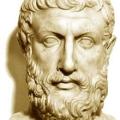8 - You Can't Get There From Here: Zeno and Melissus
Posted on
The paradoxes of Zeno and the arguments of Melissus develop the ideas of Parmenides and defend his Eleatic monism.
Themes:
Further Reading
J. Faris, The Paradoxes of Zeno (Aldershot: Ashgate, 1996).
P.S. Hasper, “Zeno Unlimited,” Oxford Studies in Ancient Philosophy 30 (2006), 49-85.
J. Lear, “A Note on Zeno’s Arrow,” in Phronesis 1981, 91-104.
R. McKirahan, “Zeno’s dichotomy in Aristotle,” in Philosophical Inquiry, 23 (2001), 1-24.
J. Palmer, “Melissus and Parmenides,” Oxford Studies in Ancient Philosophy 26 (2004), 19-54.
G.E.L. Owen, “Zeno and the mathematicians,” in Proceedings of the Aristotelian Society, 58 (1958), 199-222.







Comments
In reply to Contradictions by Peter Adamson
models of contradiction
Where I am stuck is this: I don't see how there could conceivably be a consistent model for a self-contradictory situation, which would have to be imaginary by definition. This is perhaps one of those things that I will have to ponder further. I don't think I can state my difficulty any more clearly than I have, and perhaps by further thought I will see how to say what I think, or else realize that I am not thinking correctly. The issue seems to be how exactly a mathematical model is related to reality. Your reply is certainly clear, but not convincing ... yet; and I thank you for taking the time to think about this with me.
Does mathematics have a response to Zeno's "paradox"?
Yes, it does--the limit. To the extent that Zeno's paradox can be phrased as a well-posed question at all, it can be answered in terms of basic limits in a way a Russian grade schooler could explain. Alternatively, if your interlocutor refuses to phrase the "paradox" in a well-posed way (e.g. "how can you perform an inifinite number of actions in a finite amount of time?" when "action" is not a well-defined term), it can simply be dismissed, since there's no point in arguing an ill-posed question.
Any modern discussion of infinity--even analyzing ancient thinking--without a solid background in set theory and mathematical analysis is unproductive--mathematicians have had a good grasp of infinity for a while, and this will necessarily carry over to any philosophical concept. Worse yet, I suppose, is a superficial understanding like that of Hilbert's hotel given below.Hilberts hotel is just a demonstration of the difference between finite, countably infinite, and uncountably infinite cardinals, not any refutation of "actual infinity", whatever that means.
"Standard Solution" LoL
These paradoxes cannot be "standardized" or distilled into mathematical "puzzles" that are somehow easily solved by Calculus or some stupid crud dude.
These thinkers, especially Zeno, are 100% Dualists, meaning to interpret, properly, the "puzzle" behind these paradoxes, one must:
Interpret them from THEIR framework(s).
Accept Infinities as conceptual fact.
Thinkers who want to "solve" these must understand this "Standard Solution's" main premise that necessitates its proof(s) is based and rooted in Modern science/math and most importantly and especially, Scientific Materialism.
Achilles and the Tortoise
Assert first that Infinity is a conceptual truth - at least - in some sense//domain
Theoretically, in an Infinite Realm,
the Tortoise can elude
the trained hunter Achilles;
because a SCENT
cannot linger
INFINITELY...
within and without
an infinity of concepts.
The Dichotomy
Root origin helps solve this and break it open for PHL understanding
... DICHOTOMEUS ...
Dicho - two
Tem - to cleave//spinover (fusion of concepts)
Meus - My Self (first person singular)
Mous - meek
My - accordingly / In agreement
Lytmos - appearance / character
Also...
S O N O L U M I N E S C E N C E
Nonbeing
Where do vanished objects go? Into nonbeing, that is to say everything.
I have a few question.
First I would like to say thank you for responding to my previous comments, next paradox, as I understand it, mean "A statement contrary to common sense, but yet may still be true. Next I was wondering, do you you have any recommendations on reading/listening for philosophy in the modern world, thanks
In reply to I have a few question. by Jaxson
Other listening
If you look under "Links" at the bottom of the page I actually have a page of recommendations on other podcasts about philosophy, which often cover modern topics.
Add new comment